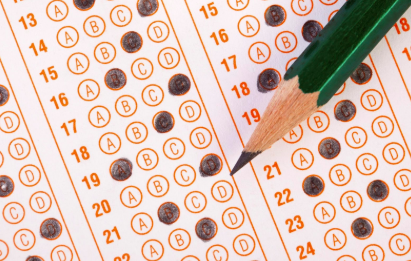The Flaws of Standardized Testing
April 4, 2019
“SAT.” “PSAT.” “ACT.” “AP Exam.” “PARCC.” “NJ ASK.” For years, students in New Jersey have dreaded hearing these abbreviations ring in their ears. Typically on a yearly basis, children and teenagers have been glued to a classroom desk for several hours, forced to fill out bubble letters on scantrons or on computers. Most students in high school can even remember their times in elementary school as 8 or 9-year-olds, solving simple multiplication problems and writing narrative stories in an NJ Ask-labeled booklet. Basically, every student can attest to the annoyances and grievances of such standardized-testing. Now don’t get me wrong, all students are encouraged to do their very best on such tests, but it does beg the question: what is the point of standardized testing and how flawed is the system?
These tests are intended to put students on a level playing field, placing every student on the same spectrum and seeing where each person fits. Although administrators and colleges understandably want to see kids with objectively-determined scores, as opposed to GPAs/grades which can vary by school and teacher, the numbers still fail to provide a fair opportunity for all students. For instance, some children may have a strong support system where educators and tutors aid them in developing test-taking skills. Their parents may also be able to afford test prep services or hire top-notch tutors to give the student advice and tips on preparing for the particular test. Therefore, this person will likely perform very well, while those who are not handed such resources may not have as high scores. Although both types of students could hypothetically have very similar academic prowess, one may simply outperform the other because he or she is guided in the test prepping process.
High-scorers on tests such as the SAT and/or ACT may just simply be good at taking tests, which is not exactly a valuable skill in the real world. Although organizations like the College Board claim that they test students on what they have learned in the classroom, students can definitely say that taking the tests do not accurately represent one’s academic knowledge from school. This is exemplified through tips provided by test-prep services and tutors. For instance, rather than solving a math problem thoroughly with algebraic concepts, as one typically would in the classroom, strategies often guide students to cheat their way around and find a shortcut to the answer, consequently answering questions faster and more accurately and thus getting a higher score. If students are encouraged to solve questions by not going through the proper steps (as they are taught in the classroom), doesn’t it defeat the purpose of taking the test? Doesn’t it make test-taking unfair for those who are not provided those “shortcuts,” and as a result, may receive lower scores? Regardless, such tests are mostly deemed necessary for the sake of developing appealing college resumes, but the skill of reading/comprehending passages, solving math problems, and bubbling in answers may not be as important in one’s future as people often think.
So have administrators and educators noticed these points? Yes. Many colleges have become “test-optional” schools, meaning that applicants’ test scores will not be taken into consideration during the admissions process. Admission officers at these schools do not label students with four or two-digit numbers but instead focus on their hard-earned grades, accolades, and contributions to their schools and communities. Additionally, at the beginning of the 2019 year, the state of New Jersey deemed PARCC-testing unnecessary for schools, banning it from graduation requirements. Many people seem to notice the flawed, somewhat unnecessary system, and many educational institutions seem to be heading in the right direction. As of now, however, the majority of standardized-testing does not seem to go away any time soon, so those SATs and ACTs will still be prevalent in high schoolers’ lives. Students should not worry too much about test scores, however, instead focusing on meaningful passions and gaining genuine, important knowledge through education in and out of the classroom.










